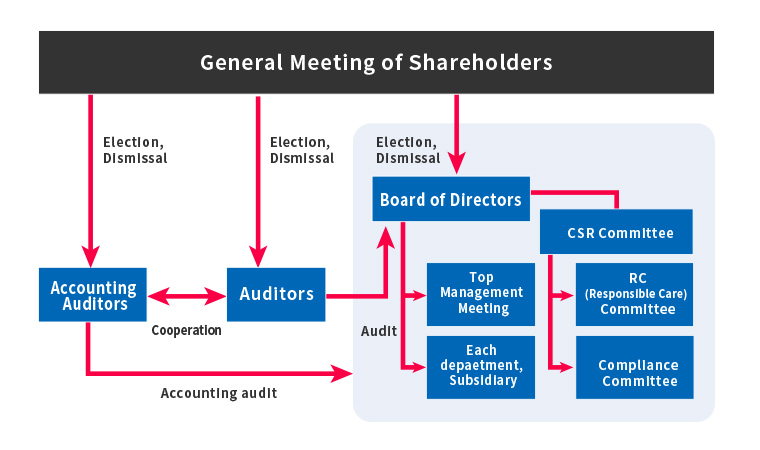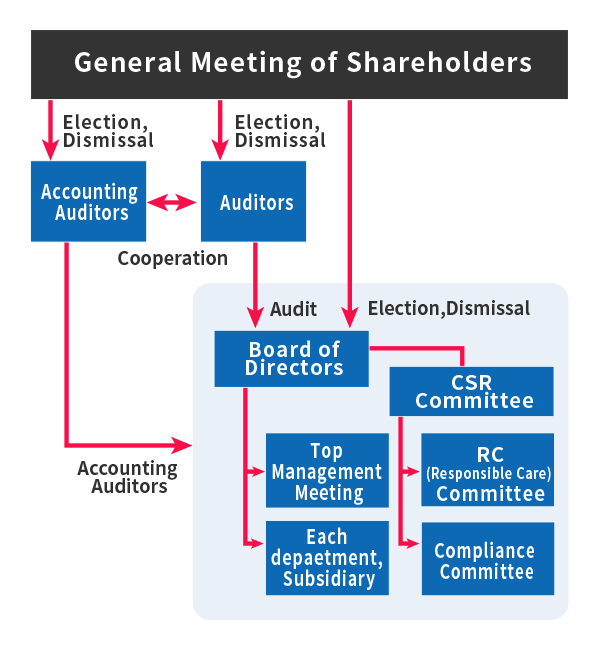



Nippon Paint Automotive Coatings Co., Ltd. (hereafter referred to as “NPAU”) is engaged in a company-wide commitment to enhance the satisfaction of its shareholders, customers, and various other stakeholders and to realize the long-term growth of the company. Considering corporate governance as an essential part of the management base, NPAU is working to enhance and reinforce corporate governance programs.
To secure management transparency and fairness, NPAU has established the corporate governance structure described below.


The Board of Directors
The Board of Directors are comprised of three directors as of April 2019.
Regular meetings of the Board of Directors are held monthly to make resolutions on matters specified by relevant laws and regulations and other important managerial issues and to supervise directors’ implementation of their duties. When necessary, extraordinary meetings are held to ensure timely decision making. To clarify responsibilities of individual directors, their terms of office are limited to one year.
Auditors
NPAU has two corporate auditors as of April 2019.
Auditors supervise the directors to ensure that they fulfill their duties. Auditors also attend meetings of the Board of Directors and other important meetings to share their views and work to secure the fairness and transparency of NPAU’s management.
Top Management Meetings
Top Management Meetings are chaired by the President & CEO and attended by Directors, Division Directors, and Executives. The meetings are held twice a month to ensure timely business operation.
At the meetings, members report and discuss various measures regarding basic management policies set in line with the resolutions of the Board of Directors, along with issues related to other important business operations.
CSR Committee
The CSR Committee, held twice a year, is chaired by the President & CEO, comprised of Division Directors, Executives, and other members. At the meetings, members discuss measures to cultivate and improve a corporate culture that encourages company-wide efforts in CSR activities from the viewpoints of reinforcing legal compliance, responsible care, and social contribution, among others.
Compliance Committee
The Compliance Committee, chaired by a Managing Director, comprised of Functional Managers. At the committee’s meetings, held four times a year, members identify various compliance risks involved in the NPAU Group and discuss measures to take. At the same time, the committee organizes educational programs on compliance and prepares in-house regulations to prevent compliance problems.
RC (responsible care) Committee
The RC Committee, chaired by a Managing Director, comprises Functional Managers and holds committee meetings four times a year. The committee supports RC activities at all of the domestic operational sites and sections of NPAU group companies. In addition, the committee identifies challenges and hear requests concerning individual activities in order to improve performance.
NPAU has established internal control systems with the aim of securing management efficiency and the reliability of financial statements, as well as ensuring legal compliance and promoting risk management. The NPAU’s internal control systems (systems to secure operational appropriateness) comprise the following:
A system to ensure that the directors and employees of NPAU and its affiliated companies fulfill their duties in compliance with laws, regulations, and the company’s Articles of Incorporation
(a) NPAU’s Board of Directors make decisions on strategic managerial issues and matters concerning the basic management of NPAU and the group of companies stipulated in the Management Code for NPAU’s Affiliated Companies (hereafter referred to as “the NPAU Group”) pursuant to relevant laws and regulations, the company’s Articles of Incorporation, the Board of Directors Rules, and other relevant codes. In addition, the Board of Directors supervises the directors’ execution of their duties.
(b) NPAU’s directors attend annual seminars to acquire and deepen necessary legal knowledge and thoroughly observe relevant laws and regulations and the company’s Articles of Incorporation.
(c) NPAU works to ensure compliance with relevant laws, regulations, and business ethics of the NPAU Group. To this end, the company places CSR as the top priority of its management and has established the CSR Committee, chaired by the President & CEO of NPAU.
(d) NPAU has set a contact point for the whistleblowing system established by Nippon Paint Holdings Co., Ltd. (hereafter referred to as “NPHD”) for whistleblowing by staff of NPAU, its subsidiaries in Japan (hereafter referred to as “the NPAU Domestic Group”), and staff members of NPHD and NPAU dispatched to affiliated companies both inside and outside Japan.
A system to preserve and manage information concerning execution of duties by NPAU directors
Pursuant to relevant laws, regulations, and information control codes, NPAU preserves and manages the minutes of general meetings of shareholders, meetings of the Board of Directors, Top Management Meetings, and other important meetings; documents requesting managerial decisions; and other documents and electronic record on directors’ performance of their duties. At the same time, NPAU has established a system to disclose them to directors and auditors when necessary.
Codes and systems to manage the potential risks of damage and loss to the NPAU Group
(a) NPAU properly and constantly monitors risks involved in the NPAU group’s business operations by reporting and discussing such risks at the meetings of the Board of Directors, Top Management Meetings, Management Meetings (hereafter referred to as “MM”), and other important meetings.
(b) NPAU’s CSR Committee constantly reviews and improves the internal control system and the management of important risks of the NPAU Group’s safety, environmental protection, quality, and legal compliance.
(c) NPAU has set up the Internal Audit section to secure the effectiveness of the NPAU Group’s internal control system.
Basic approach to eliminating contacts with any anti-social group or organization and related systems
(a) The NPAU Domestic Group companies will have no relationships whatsoever with any anti-social group or organization which threatens social order and the safety of citizens. Moreover, the Group will remain steadfast in its attitude, refusing any approach of members of an anti-social organization in a determined manner.
(b) The NPAU Domestic Group has settled guidelines on how to oppose an anti-social group or organization and organizes in-house educational programs on a continual basis to reinforce the staff’s power to counter such a group. At the same time, the NPAU Group companies in Japan has established an appropriate system to reinforce organizational response through joint efforts with external agencies, such as the police.
A system to secure the efficiency of the execution of duties by directors of the NPAU Group
(a) Based on the management policies and the management strategies of NPHD and the NPAU Group, NPAU settles medium-term management plans. In line with the management plans, NPAU annually draws up a budget for the NPAU Group and determines programs to implement. NPAU also reports the progress of the programs and achievement levels of set goals to its Board of Directors.
(b) To clarify responsibilities of individual directors, their terms of office are limited to one year.
A system to ensure appropriate business operations in the NPAU Group
(a) As its values and guidelines, the NPAU Group shares NPHD’s Management Philosophy, comprising Mission, Vision, Value, and Way. To enable the sustainable growth of the entire NPAU Group and enhance its corporate value in the medium and long terms, all members of the NPAU Group are encouraged to deeply understand the NPHD’s Management Philosophy and engage in daily business while adhering to its principles.
(b) NPAU appoints either one or more of its directors (including any equivalent person) as members of the Board of Directors of its major affiliated companies to thoroughly promote NPAU’s management policies.
(c) NPAU settles regulations of authority and responsibility and the regulations of the management of affiliated companies. Pursuant to these regulations, the NPAU Group reports specific matters to NPAU and NPHD and asks for approval of strategic matters from the Board of Directors of both NPAU and NPHD.
Assignment of employees to assist NPAU’s auditors, the independence of such employees from directors, and securing effectiveness of auditors’ instructions to the such employees.
(a) In consultation with auditors, NPAU appoints staff to assist auditors (to serve concurrently with their original posts).
(b) The staff of auditors assist auditors with their audit activities and conduct a survey and other tasks necessary for audits upon auditors’ instructions.
(c) Changes in the posts of the auditors’ staff, including their appointment, dismissal, and transfer, will be determined by the Board of Directors after receiving full-time auditors’ agreement.
Reporting system to NPAU’s auditors and the system to protect reporters to NPAU’s auditors from any retaliatory treatment because of their reporting
(a) Auditors can attend meetings of the Board of Directors, Top Management Meetings, MM, CSR Committee meetings, and other important meetings to confirm and audit discussions and decisions made at such meetings regarding business operations.
(b) As necessary, auditors can ask directors, related departments, the NPAU Group, and other related parties to report on their business operations.
(c) If directors and employees of the NPAU Domestic Group, staff dispatched from NPHD and NPAU to affiliated companies inside and outside Japan, and parties who received reports from them have come to know of a fact that may cause significant damage to the NPAU Group, such as a violation of laws and regulations or the occurrence of a serious accident, they shall promptly report it to NPAU’s auditors.
(d) NPAU has established a system that ensures employees of the NPAU Group companies in Japan and the members of NPHD and NPAU dispatched to affiliated domestic or overseas companies can directly report to NPAU’s auditors without suffering from any disadvantage.
Other systems to ensure effective audits by NPAU’s auditors
(a) Representative directors and auditors hold regular meetings to share information and exchange views.
(b) Auditors of NPAU will coordinate and share information with accounting auditors, auditors of NPHD and affiliated companies, the Corporate Audit section of NPHD, and the internal audit section of NPAU as appropriate.
(c) When auditors find it necessary, they can appoint lawyers, certified public accountants, consultants, and other external specialists. Expenses of audits, including those needed to appoint such external specialists, shall be borne by NPAU.

